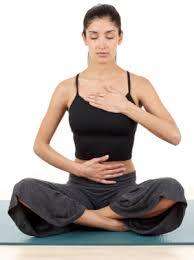Panic attacks come in all forms, all of which suck tremendously. They can be brought on by specific triggers or seemingly come out of nowhere with no rhyme or reason. They can vary from feeling like you're dying to getting the shakes to anything in between. How are you to deal with these potentially debilitating moments when time seems to freeze, the world disappears around you, and all you know is the all-encompassing feeling of your panic?
From personal experiences to research I've explored during my own navigation through panic hell, I'm going to share with you some tips I've learned along the way in coping with panic. Attacks have surprised me with aching chest pains that hurt so much I thought I was having a heart attack, (which, of course, doesn't help the panic), shortness of breath, shakiness, faintness, dizziness, chills, hot flashes, nausea, gut pain, and sometimes sobbing uncontrollably while gasping for air. In such moments, there are a few techniques that I resort to in order to relieve the consuming symptoms. Here we go:
1. Stop. I definitely have to sit down or step away. Sometimes, if the situation allows, I rush outside to get a breath of fresh air.
2. This brings me to a hugely beneficial coping technique and that is breathing. Ever heard of belly breathing? It's when you put one hand on your belly and one hand on your heart. Breathe in for four seconds, filling your belly so that it expands outward like a baby's belly does, hold it for two seconds, then breathe out deeply emptying your belly and chest of air. Repeat. I usually have to close my eyes to do this in an attempt to shut out the external stimuli.

3. Being mindful of your breathing is another mode of calming down. What this means is only to focus on your breath: Where is it coming in? How does it feel? What does it sound like? Where does it flow to in your body? How does it feel as it exits your body?
4. When I feel a panic attack approaching, I admittedly do reach for the occasional Xanax; however, when I want to avoid relying on the medicine, (because eventually it loses its potency if we take it too often), I resort to essential oils. Aromatherapy is another form of breathing, really, except now you have something pretty to smell. I've noticed that peppermint and lavender are incredibly helpful when I need to calm down. These can be purchased at most health food stores or vitamin shops and aren't very expensive. There's another company I like to use for my essential oils called doTERRA, which can be found at http://do-essential-oils.com/. They are quite expensive, but their essential oil blends are so amazingly relaxing. I use their PastTense Tension Blend and ClaryCalm, and they help tremendously in taking the edge off.
5. Water is another natural substance we can use in helping calm the rush of nerves. Drinking cool water, splashing water on your face, or making a wet, cold compress to lay on the back of your neck or forehead can soothe the mind and body.
6. You wouldn't think movement would help when your heart rate is already elevated, but in many cases, taking a walk can calm the anxiety and clear your mind.
7. Progressive muscle relaxation is another suggestion. You start with your toes, contract them, hold for 5 seconds, then release. You do this with each isolated muscle group as you move up your body.
8. Preparation or having "safety blankets" provides a sense of security that can greatly aid you in the midst of panic. For me, my sense of security involves me always having a bottle of water handy, mints or hard candy to calm me, along with my appropriate medication. Simply knowing that I have my "safety blankets" helps to alleviate the onset of an impending attack or alleviate the attack itself.
Mind you, these tips are coping mechanisms to use in those desperate moments of a panic attack, but there are things we can do to prevent these attacks from happening in the first place. Practicing meditation, mindfulness, and yoga are instrumental in developing a sense of inner peace. Therapy and medication if needed and prescribed your physician helps in managing the anxiety. Exercise and eating healthy keeps your body and thus your mind strong. Most importantly, self-care needs to be a priority. Taking care of yourself is not selfish; it is self-preservation and is absolutely necessary. These practices probably won't dissolve your anxiety completely, nor will they make all of your panic disappear overnight; however, if you make a habit of finding what works for you and using it, the better you can manage and alleviate your anxiety and panic.


Anxiousness comes in any form. Your simple data-image is just pretty amazing to describe the actual cyclone from the main issue that is triggering additional associated problems. It’s generally thought that anxiety disorders could be of numerous types. Consequently, it is better to get medicine and also to possess some persistence. Many thanks!!!
ReplyDelete